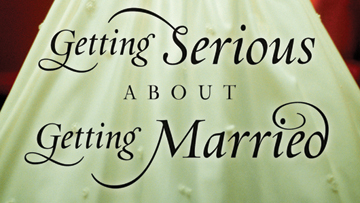You have free articles remaining this month.
Subscribe to the RP Witness for full access to new articles and the complete archives.
Getting Serious About Getting Married: Rethinking the Gift of Singleness, by Debbie Maken. Reviewed by Missionary Stacie Shopp.
“If God had designed man to be solely content in God alone, there would have been no reason to create Eve to be Adam’s wife. Before Eve arrived on the scene, Adam and God had undisturbed communion—it was God who said that it was not good for the man to be alone. God did not design the vast majority of us to be content without a marriage partner. God designed the spouse-shaped void to be filled by a spouse” (p. 111).
I am single. I am also 37. Many well-meaning older believers tell me that I must have the gift of singleness. What does this mean? What is this supposedly wonderful gift of singleness? Where did this whole notion come from that it is a gift for much of the population? What does God say about singleness versus marriage? Do the Scriptures indicate that most adult singles have this gift of singleness? If this is so, then what effect does that have on the current church? Has this always been the case, or has the current population been set aside for some specific reason? The author of this book claims that, “Our present position on singleness [in the church] is derived from the unholy union of culture, pop psychology, and Scripture” (p. 88).
If singleness is such a gift, then why do most of us singles want to return it? She actually says, “To flip a phrase on its head, I enjoyed my singleness about as much as a fish would enjoy a bicycle! That thought is actually a reflection of the heart of our Maker—it simply is ‘not good for man to be alone’” (p. 23).
“Had God intended a buddy system of friends and family to be a happy compromise in the fight against loneliness, He could have simply made more people from the available dust and removed Adam’s loneliness through community. But God didn’t choose any of these options. Therefore, it is safe to conclude that God’s plan was to remove Adam’s loneliness through a spouse, not through friends or community” (p. 24).
“Remember what John Calvin said? The man who chooses to stay single (without a specific call from God) is guilty of ‘stealing’ a husband from a wife” (p. 181).
This book clearly and thoughtfully walks through the biblical mandate of marriage, as well as the specific parameters for those who remain single. The author very specifically calls for a change in thought and attitude among not just singles, but the very churches in which they are growing. I found her insights to be amazingly perceptive, as well as very Reformed. In fact, I think this book is controversial for the very reason that she goes back to a biblical premise and then challenges every believer to be a part of changing the current culture’s assumptions about singleness and marriage.
“Scripture does not categorically authorize singleness. It does allow singleness for a limited few and establishes clear parameters by which they can be legitimately single (see Matt. 19:4-11 and 1 Cor. 7)” (p. 29).
“Calvin wrote: ‘Many think that celibacy conduces to their advantage and therefore, abstain from marriage; lest they should be miserable…heathen writers have defined that to be a happy life which is passed without a wife…and they attempt to render hallowed wedlock both hateful and infamous. To these wicked suggestions of Satan let the faithful learn to oppose this declaration of God, by which He ordains the conjugal life for man, not to his destruction, but to his salvation’” (p. 43).
So where does this leave those who are already married? Why should it concern them? “The Puritans were key in developing a higher standard for parental duty: parents could consider their duty done only when their children were established in their callings with good husbands and wives” (p. 54).
What effect will a non-married generation have on the church? What is the tragic effect of this false belief about singleness on the next generation?
When I read this book, I felt as if I had finally found an author who held up a biblical perspective to all aspects of life, especially personal life. She challenges everyone to be an encourager of marriage, and not to just sit back and wait for it to happen. What would the church be like if we again took up the model of the Puritans in this area?
As an older single, I found this book refreshing. The author does not sugar-coat issues. She does not detract from Scripture but instead passionately argues against the current subtle worldly philosophies that have crept in regarding singleness. These philosophies will have a dramatic effect on the current generation, as well as on the future. Will the church continue to embrace these philosophies, or turn back to God’s mandate? Debbie Maken challenges believers and the church to turn back to the biblical guidelines, and I for one plan to take up that challenge.
